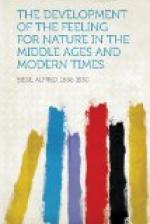In the development and maturing of the race, as of the individual, nothing is more helpful than contact with foreign elements, people of other manners, thoughts, and feelings. Intimate intercourse between different nationalities rouses what is best in the soul of a nation, inviting, as it does, to discussion and opposition, as well as to the acquisition of new ideas. The conquests of Alexander the Great opened up a new world to the Greek, and a new culture arose—Hellenism. It was a new world that rose before the astonished eyes of the Crusader—in his case too, the East; but the resulting culture did not last. The most diverse motives fused to bring about this great migration to a land at once unknown and yet, through religion, familiar; and a great variety of characters and nations met under the banner of the Cross.
Naturally this shaking up together, not only of Europeans among themselves, but of the eastern with the western world, brought about a complete revolution in manners, speech, art, science, trade, manufacture, thought, and feeling, and so became an important factor in general progress.
The narrow boundaries of nationality, race, and education were broken through; all felt equal before the leading idea; men, places, plants, and animals were alike new and wonderful. Little wonder if German knights returning home from the East wove fiction with their fact, and produced the most fantastic and adventurous heroic songs.
Many of the noblest of the nations joined the Crusades in pious ardour for the cause, and it is easy to imagine the effect of the complete novelty of scene upon them. With such tremendous new impressions to cope with, it is not surprising that even the best minds, untrained as they were, were unequal to the task, and that the descriptions of real experiences or events in poetic form failed to express what they meant. Besides this, there is no doubt that in many ways the facts fell below their ideals; also that the Crusader’s mantle covered at the same time a rabble, which joined from the lowest motives, the scum of Europe. It must also be remembered that it is far easier to experience or feel than to pass on that experience and feeling to others; that those who wrote did not always belong to the most educated; and that they wrote, for the most part, with difficulty in Greek or Latin. When all this has been weighed and admitted, the fact remains that in existing accounts of the Crusades there is great poverty of description of scenery, and lack of much feeling for Nature. The historian, as such, was bound to give first place to matters of fact and practical importance, and so to judge a place by its value to an army passing through or occupying it; by its fertility, water-supply, its swamps or stony ground, and so forth; but still the modern reader is astonished to see how little impression the scenery of the Holy Land made, judged by the accounts we possess, upon the Crusaders. Even when it is conceded that other important concerns came first, and that danger, want, and hunger must often have made everything disagreeable, still, references to Nature are very scanty, and one may look in vain for any interest in beautiful scenery for its own sake.




